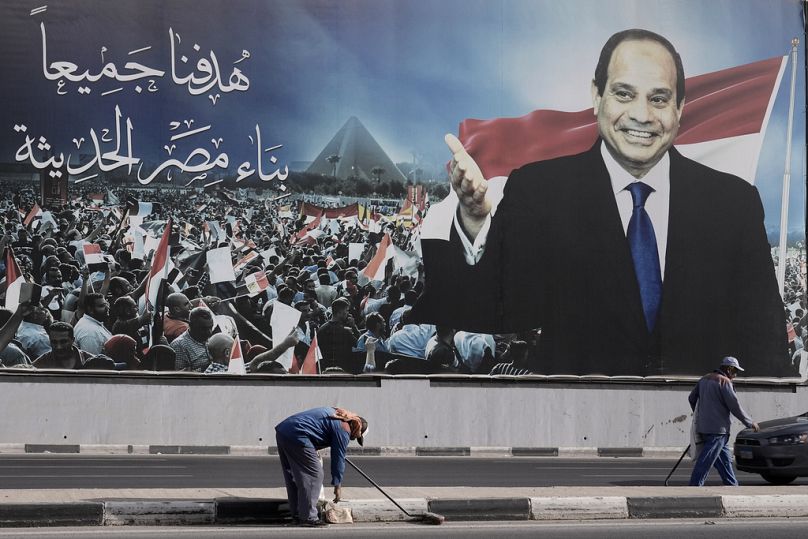His victory was widely deemed a foregone conclusion and he secured 89.6 per cent of the vote, the National Election Authority claimed.
El-Sissi, whohas ruled with an unquestioned grip for the past nine years, ran against three virtually unknown opponents.
The National Election Authority said turnout was 66.8 per cent of more than 67 million registered voters. “The voting percentage is the highest in the history of Egypt," declared Hazem Badawy, the election commission chief, as he announced the official results.
The vote was overshadowed by the Israel-Hamas war in Gaza on Egypt’s eastern border, which has threatened to expand into wider regional turmoil.
The North African country is also in the midst of an economic crisis, with monthly inflation surging above 30 per cent. Over the past 22 months, the Egypt pound has lost 50 per cent of its value against the dollar with one-third of the country's 105 million people already living in poverty, according to official figures.
A key Western ally in the region, el-Sissi has faced international criticism over Egypt’s human rights record and harsh crackdown on dissent, as did President Hosni Mubarak before him.
Despite this Egypt has been a top recipient of the U.S since it signed a U.S.-brokered peace deal with Israel in 1979. Congress in recent years has attached restrictions meant to pressure Egyptian leaders to curb human rights abuses.
The United States will provides Egypt with 1.2 billion euros in military aid this year - 290 million euros of which is conditional on human rights being better respected.
The State Department said in September that it would withhold 78 million euros that it said it was legally obligated to keep back given Egypt’s lack of progress on some specific rights, including regarding political prisoners.
Human Rights Watch tweeted that violations and repression had marred the election.
In the months before the election, el-Sissi vowed to address the country's ailing economy without offering specifics.
Experts and economists widely agree that the current crisis stems from years of mismanagement and a lopsided economy where private firms are squeezed out by state-owned companies.
The Egyptian economy has also been hurt by the wider repercussions of the coronavirus pandemic and the ongoing Russian war in Ukraine, which rattled the global market.
El-Sissi’s government initiated an ambitious IMF-backed reform program in 2016, but the austerity measures sent prices soaring, exacting a heavy toll on ordinary Egyptians.
Last December, the government secured a second IMF deal on the promise of implementing economic reforms, including a floating exchange rate. The cost of basic goods has since jumped, particularly imports.
Under el-Sissi's watch, thousands of government critics have been silenced or jailed. They are mainly Islamists but also prominent secular activists and opposition figures, including many of those behind the 2011 uprising that toppled longtime autocrat Hosni Mubarak.
A career army officer, el-Sissi, as defence minister, led the 2013 military overthrow of an elected but divisive Islamist president amid widespread street protests against his one-year rule.
He was first elected as president in mid-2014, then re-elected in 2018. A year later, constitutional amendments, passed in a general referendum, added two years to el-Sissi’s second term and allowed him to run for a third, six-year term.
Hazem Omar, head of the Republican People’s Party, came second with 4.5 per cent of the vote, followed by Farid Zahran, head of the opposition Social Democratic Party with 4 per cent. Abdel-Sanad Yamama, chairman of the Wafd Party, received less than 2 per cent of the vote.
An ambitious young presidential hopeful, Ahmed Altantawy, dropped out of the race after he failed to secure the required signatures from residents to secure his candidacy. He was considered el-Sissi’s most credible opposition figure and said that harassment from security agencies against his campaign staff and supporters prevented him from reaching the vote threshold for candidacy.












